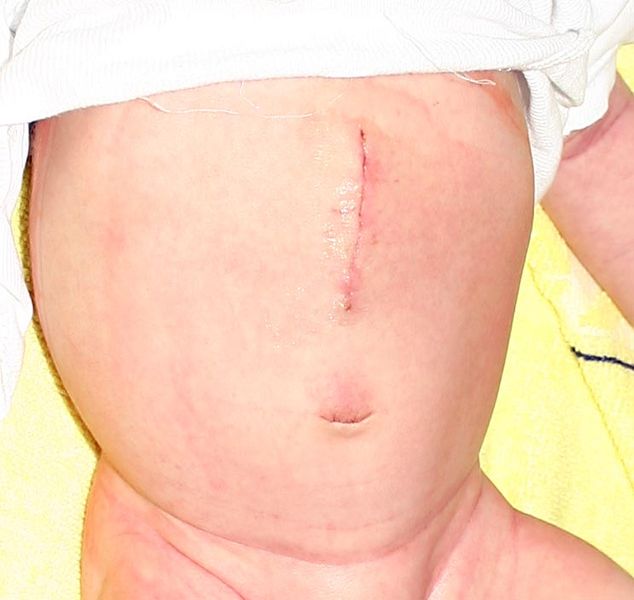Pyloric stenosis surgery: Difference between revisions
No edit summary |
No edit summary |
||
| Line 12: | Line 12: | ||
Definitive treatment of pyloric stenosis is with surgical pyloromyotomy (dividing the [[muscle]] of the [[pylorus]] to open up the gastric outlet). This is a relatively straightforward surgery that can be done through a single larger [[incision]] or [[Laparoscopic surgery|laparoscopically]] (through several tiny incisions), depending on the surgeon's experience and preference. | Definitive treatment of pyloric stenosis is with surgical pyloromyotomy (dividing the [[muscle]] of the [[pylorus]] to open up the gastric outlet). This is a relatively straightforward surgery that can be done through a single larger [[incision]] or [[Laparoscopic surgery|laparoscopically]] (through several tiny incisions), depending on the surgeon's experience and preference. | ||
Ranstedt's extramuscular pyloromyotomy remains the gold standard of treatment<ref name="pmid5136377">{{cite journal |vauthors=Markelov VP |title=[Affection of the vermilion border and mucous membrane of the lips in a patient with condyloma acuminatum] |language=Russian |journal=Vestn Dermatol Venerol |volume=45 |issue=8 |pages=69 |year=1971 |pmid=5136377 |doi= |url=}}</ref>. | |||
Once the [[stomach]] can empty into the [[duodenum]], feeding can commence. | Once the [[stomach]] can empty into the [[duodenum]], feeding can commence. | ||
Revision as of 18:34, 21 November 2017
|
Pyloric stenosis Microchapters |
|
Diagnosis |
|---|
|
Treatment |
|
Case Studies |
|
Pyloric stenosis surgery On the Web |
|
American Roentgen Ray Society Images of Pyloric stenosis surgery |
|
Risk calculators and risk factors for Pyloric stenosis surgery |
Editor-In-Chief: C. Michael Gibson, M.S., M.D. [1]
Overview
Infantile pyloric stenosis is typically managed with surgery.
Surgery

Definitive treatment of pyloric stenosis is with surgical pyloromyotomy (dividing the muscle of the pylorus to open up the gastric outlet). This is a relatively straightforward surgery that can be done through a single larger incision or laparoscopically (through several tiny incisions), depending on the surgeon's experience and preference.
Ranstedt's extramuscular pyloromyotomy remains the gold standard of treatment[1].
Once the stomach can empty into the duodenum, feeding can commence.
There is occasionally recurrence in the immediate post-operative period, but the condition generally has no longterm impact on the child's future.